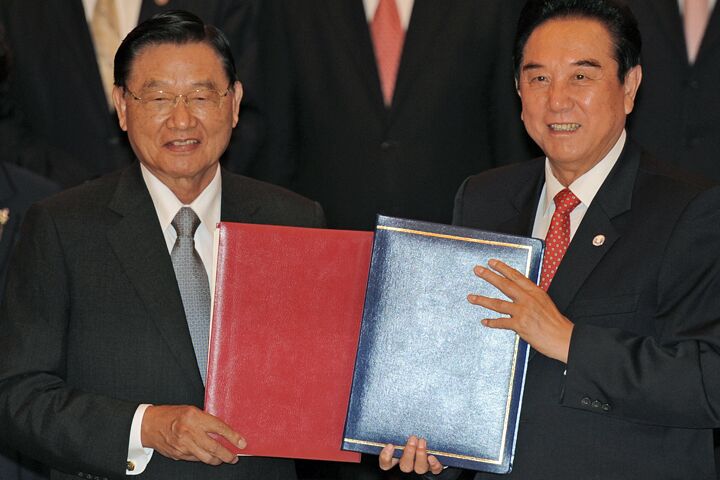
China, Taiwan Forge Closest Ties Yet
China and Taiwan signed a historic agreement on Tuesday that forges the strongest ever trade ties between Asia’s rising giant and its longtime rival. The ambitious deal heralds a bold step toward reconciliation between the former enemies, but has many Taiwanese concerned that their nation’s direction will erode away its independence.
The trade pact, called the Economic Cooperation Framework Agreement (ecfa), will significantly reduce tariffs and open up mutual market access across the Taiwan Strait. The agreement will grant favorable tariffs to more than 500 categories of Taiwanese products being imported to China, while Chinese producers will receive tax breaks on about 260 types of products. It is by far the most important of the dozens of economic agreements Taipei and Beijing have signed in the two years since pro-China Taiwanese President Ma Ying-jeou came into power.
“Part of ecfa’s significance is that each side is telling the other that it wants to solve problems through sincere negotiations instead of by cursing and political warfare,” said Hu Shiqing, a researcher at the Taiwan Studies Institute of the China Academy of Social Sciences.
But not all Taiwanese are celebrating the pact and Beijing’s vamped-up diplomacy in Southeast Asia.
During a June 26 demonstration in Taipei, tens of thousands of Taiwanese chanted anti-Communist mantras and protested the ecfa, fueled by fears that the deal will boost China’s influence and whittle away Taiwan’s political sovereignty.
Among the analysts who oppose the landmark agreement is National Taiwan University Prof. Kenneth Lin, who says China has intentionally left the ecfa as the only economic path for Taiwan to travel.
“After signing ecfa with (China), then Taiwan, asean and (China) will form the hub-and-spoke framework—that is, the preferential trade arrangement only exists between Taiwan and (China) and between asean and (China), but there is no preferential trade arrangement between Taiwan and asean,” Lin said.
Critics of the agreement also fear an influx of cheap labor into the island, and that Taiwan will soon be made to open up its financial or services sectors to Beijing.
But the core of the issue is that Taiwan is negotiating with an immensely powerful neighbor that simply does not recognize its right to exist as an independent entity. This fundamental reality makes ecfa more than just another free-trade pact, and it should give Taipei pause regarding Beijing’s overtures toward the island.
Though the critics are adamant, opponents hold too few seats to block the agreement, and finalization is expected later in the summer.
Beijing has admitted that it sees the trade deal as a stride toward greater political integration between China and the island nation that it considers to be its territory. China remains committed to establishing its dominance over the Taiwanese people.
Herbert W. Armstrong predicted the fate of Taiwan over 50 years ago, writing, “Will Red China invade and capture [Taiwan]? In all probability, yes …. The Red Chinese will ‘save face,’ and the United States, with many American troops now on Taiwan, will again lose face!” (letter, Sept. 19, 1958).
Regardless of steady U.S. arms sales to Taiwan, there are very few in Beijing, Taipei or elsewhere who believe that the Obama administration would assertively assist Taiwan in the event of military conflict between mainland China and the island. The outcome of reunification is now settled, leaving only the question of how it will be effected. It is not in Beijing’s interests to wage war to achieve that outcome. Besides hampering trade, China’s neighbors would respond to such an altercation by bolstering their defenses.
Instead, China’s gentle approach will continue until Taiwan is offered something like the status Hong Kong currently has. Should Taipei refuse China’s advances, Beijing would likely respond with threats of force.
The rapidly warming relationship between China and Taiwan is a step toward the realization of Mr. Armstrong’s forecast. China’s “invasion,” at this point, is through soft power and diplomacy as Beijing forges unprecedented inroads into the Taiwanese economy. But Taiwan’s desire to cozy up to China will eventually lead to the end of its autonomy.
China’s long-term perspective on Taiwan can be summarized by the sagacious words usually attributed to the country’s most famous philosopher, Confucius: “It does not matter how slowly you go so long as you do not stop.”
